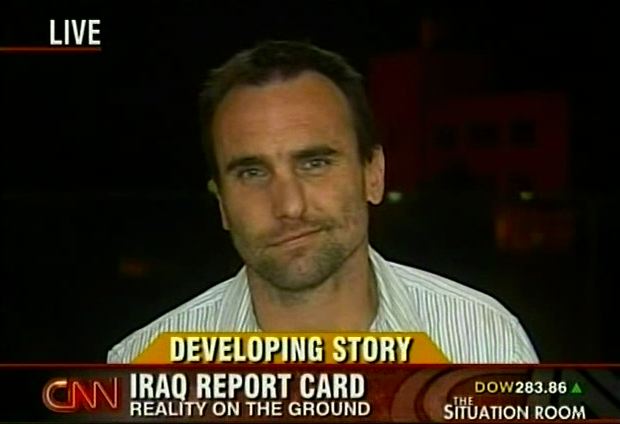TSR: "These insurgents are not bound by the same rules as the American military."

Click photo to play
Length: 4:08
WOLF BLITZER: In Iraq meanwhile, the Interior Ministry says 19 people were killed today in a Baghdad mortar attack and the exchange of fire which followed.
Let's get a reality check of the actual situation on the ground.
No one better to do so than Michael Ware, our correspondent, joining us in Baghdad -- Michael, the president made a major point of saying that it wasn't that long ago that the al-Anbar Province sort of was written off as lost because of Al Qaeda's strength, the insurgent Sunni strength there, but now it's made a comeback.
It has made a comeback, but it's been at a cost, is that right?
MICHAEL WARE, CNN CORRESPONDENT: Oh, absolutely, Wolf.
Now, what the president is saying is true. Al-Anbar, in terms of Al Qaeda violence, has been checked to a fairly dramatic degree. That can't be begrudged. And it's through initiatives of the U.S. military.
But what they've done is -- it means they've had to cut a deal with the Sunni/Baath insurgents. America doesn't know where Al Qaeda hides. America doesn't know where the facilitators are. The insurgents do. So they've turned the insurgents against Al Qaeda. These insurgents are not bound by the same rules as the American military.
So these men can literally go out and use excessive force to arrest and interrogate Al Qaeda suspects and they can execute them. Indeed, we've unearthed video evidence of this and we've interviewed some of the militia members, as well, to confirm it. So that's one aspect.
The second aspect is that this success using these Sunni insurgents is driving a wedge between the U.S. and the Iraqi government. The Iraqi government is vehemently opposed to this program. They see it as America putting ammunition in the guns of armed groups who actively oppose this government. They suspect that this is an American insurance policy or a counterbalance against the government.
Why?
Because this government is Shia dominated. It's controlled mostly by militias, most of whom, according to U.S. intelligence, are controlled by Iran. So, it's not without a price -- Wolf.
BLITZER: So the criticism against this Shia-dominated government coming from Washington, whether in the report card or from what various politicians are saying, how do they react to that criticism?
Do they react by doing what they're supposed to do or do they get their backs up and they just get angry and not do what they are supposed to do?
WARE: you know, what I actually suspect that this government does, or the key driving factions within it do, is they don't react negatively. They don't get their backs up. They don't get defensive.
What they do is they play American domestic politics, the American domestic mood, against the mission here. Indeed, when you talk to some of these Shia hard-liners with links to Iran within this government, you listen to them and it's so clear that they are finely tuned in to the American public mood and they shape their answers just so. At the end of the day, whatever the administration cares to say about this government, they turn it against America.
They say, "You criticize us because we're not taking control of security. Well, you don't treat us as a sovereign state. You don't let us control our armed forces. You don't let us operate the way we want to. Get out of our way and then you'll see security."
So they're quite clever, in fact -- Wolf.
BLITZER: Michael Ware reporting for us from Baghdad.
Michael, thanks very much.
WARE: Thanks, Wolf.
BLITZER: Let's go to Jack Cafferty in New York for The Cafferty File.
When he speaks, a lot of people should listen -- Jack.
We've said this before.
JACK CAFFERTY, CNN CORRESPONDENT: Well, you get a context and a depth of understanding of the mindset over there that I don't think is available too many other places. We're privileged to have Mr. Ware join us here periodically.
